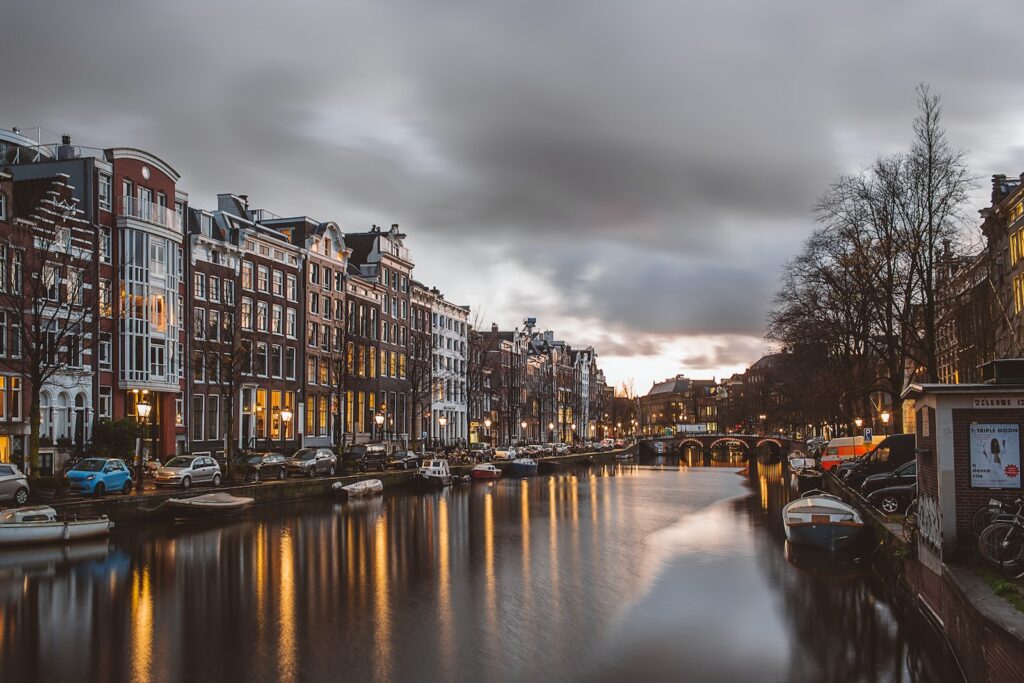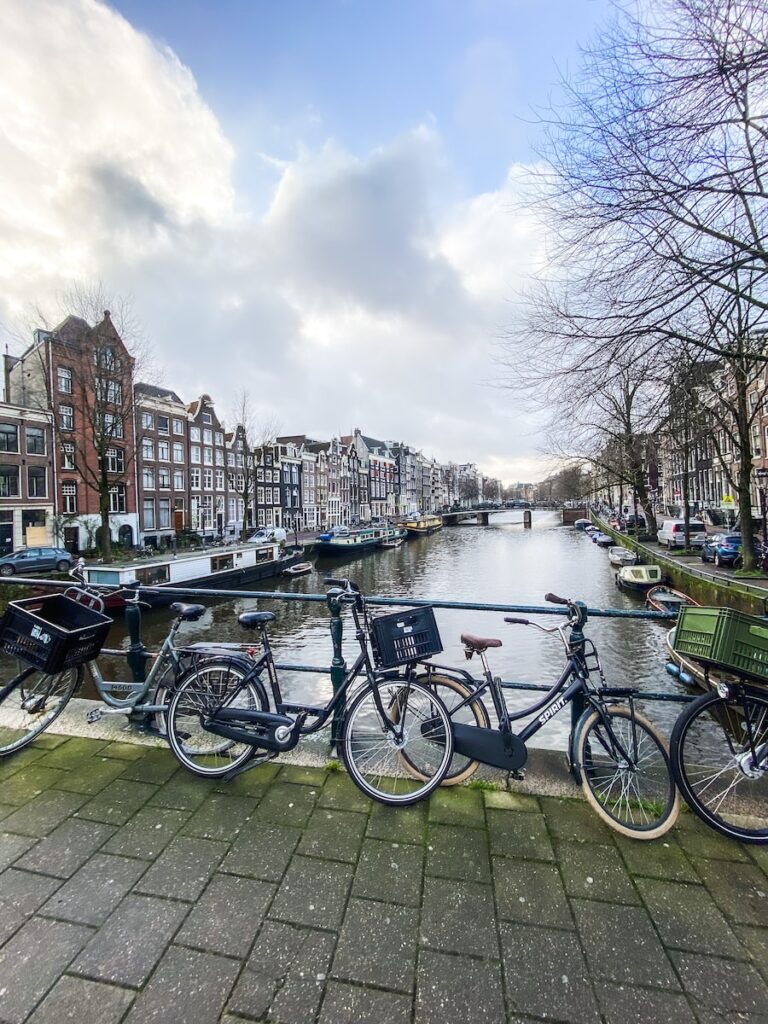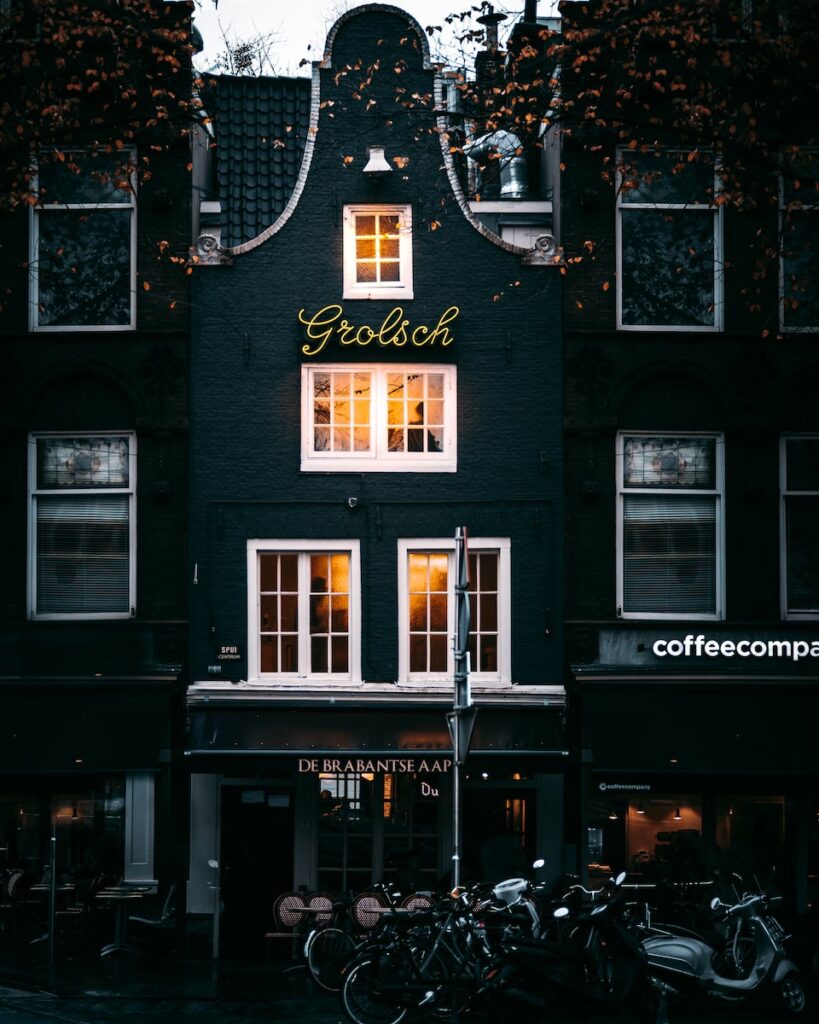Expats in Amsterdam: Everything You Need to Know
Amsterdam is one of western Europe’s most popular cities for hunting out a brand-new life in a brand-new place.
Often voted as one of the world’s most liveable cities, Amsterdam is home to almost 900,000 people (with around 95,000 of them expats)… and the city offers a brilliant life for endless types of people.
It’s interesting, fun, safe, trendy, diverse, and packed with mega-modern conveniences and facilities. And that’s just the beginning.
So if you’re considering embracing the expat life in Amsterdam, you’re definitely not alone.
But maybe you’re not 100% sure whether life there is for you. So if you need a gentle little push either way, we’re here with everything you need to know about potentially joining the expats in Amsterdam.
We’ve brought you details on perks, prices, pros, cons, nightlife, neighborhoods, cycling, sustainability, where to live in Amsterdam as an expat, and plenty more. Whatever you need to know, we’ve got it covered.
Hop on your bike, grab yourself a stroopwafel, and come meet us by the canal!
Pros and cons of being an expat in Amsterdam
Pros of living in Amsterdam
- Hearty doses of arts and culture: the city is home to a huge number of art galleries, cultural institutions and museums. You’ll always find events, entertainment, things to do, and places to learn.
- Lots of other expats: around 10% of Amsterdam’s residents are from outside of the Netherlands. So no matter where you’re from, you’ll be able to find friends, and you’ll always be welcome in the city.
- It’s a nice size: Amsterdam is a big city, but it’s not a massive city. It’s easy to feel at home here, and it’s easy to map out the city in a few weeks… but there’s also enough to keep you entertained for many years. It’s a size compromise in all the best ways.
- It’s super cycle-friendly: for exercise-loving expats in Amsterdam, this is one of the biggest perks of living in the city. It’s completely possible to travel around on nothing but a bike—it’s estimated that Amsterdam is home to more than 800,000 bicycles.
- High levels of English: of course, you’ll have a much more fulfilling life if you understand the local language. But you can easily get by in the city without ever deviating from English.
- Health and education are both excellent: maybe you need regular access to good healthcare. Maybe you’re moving with kids who need good schools. Maybe you’re hunting for a good university. In Amsterdam, you’ll get all that and more.
- Public transport is excellent: here’s one of the biggest perks of expat life in Amsterdam. The public transport system is reliable, well-connected, and easy to use, and there’s typically no need for a car.

Cons of living in Amsterdam:
- High cost of living: Amsterdam can be a super-pricey place to live, and it’s more expensive than most other cities on the planet. We’ll cover those costs in more detail soon, but don’t expect an affordable existence.
- Lots of banal bureaucracy: like lots of western European nations, the Netherlands loves bureaucracy. Expect to sign lots of forms, make lots of applications, stand in endless queues, and talk to lots of officials.
- Lots of rain: Amsterdam is a very rainy city, with an average of between 9 and 14 rainy days per month (across all seasons).
- It’s difficult to find a place to live: for many expats in Amsterdam, this is the most frustrating part of living in the city. We’ll bring you more details soon… but without organizing a serviced apartment or a serviced flat, you might struggle to secure a home.
- Lots of tourists: if you’re planning on enjoying a big long dose of expat life in Amsterdam, you’ll eventually get irritated by all the tourists. But it’s not all bad—you can largely avoid the crowds by staying out of the city’s very center.
- It can be hard to find a job: yeah, there are lots of job opportunities here. But there are also endless people applying for each vacancy. Competition is high, and application processes close quickly… so don’t expect to find a job right away.
- Taxes are high: income tax rates are surprisingly lofty. If you earn €68,507 or more, you’ll pay a massive 49.5% tax. Even the lowest earners pay 37.1% tax. And on top of all that, owning a car (not that you necessarily need one) is also super expensive.
Public transport in Amsterdam
Amsterdam’s public transport system is excellent. Made up of a reliable, well-connected, and city-wide network of trams, metros, buses, trains and ferries, you can easily get around the city without a car.
The easiest way to use this transport is by getting a so-called ‘OV-chipkaart’. Just like any travel card in any major city, you top it up with money whenever you run short, and tap it onto the card reader every time you clamber onto public transport. You can use this OV-chipkaart for all types of public transport in Amsterdam.
Public transport in Amsterdam is basically cash-free…. so it’s a good idea to get one of these OV-chipkaarts. As of summer 2022, it’s also possible to use a debit card or credit card to ride on public transport (but that’s of course only possible if you have a bank account in the Netherlands, which we’ll come to next).
And as we’ve already covered (and as you probably already knew!), it’s also possible to get around Amsterdam exclusively by bike—if you like traveling around on two wheels, this is the perfect city for you. If you don’t have your own bike, it’s possible to rent one at many high-quality and reliable venues across the city..

Opening a bank account for expats in Amsterdam
For new expats in Amsterdam, opening a bank account is one of the first and most important steps—without one, you won’t be able to do much in the city.
To open a bank account, you’ll usually need four different documents:
- Your ID (such as your passport)
- Proof of address (such as your tenancy agreement)
- Your citizen service number (which is also known as ‘burgerservicenummer,’ or ‘BSN’). You get this by registering in-person at an official city office
- If you’re not from within the EU, you’ll usually also need your residence permit, which you apply for after arriving in the Netherlands. If you haven’t yet received this residence permit, you can instead use official proof that you’ve registered with local police
Some of the most popular traditional banks are ABN AMRO, ING, and Rabobank.
For something more stress-free, both Bunq and N26 offer excellent online-only options, with no physical branches. It can often be much more simple and hassle-free to open an online-only account.
Best neighborhoods to live for expats in Amsterdam—where to live in Amsterdam as an expat
Want to know where to live in Amsterdam as an expat? Here are some of the most popular options…
- Amsterdam Noord: north of the city’s river, this emerging area is (for now!) still a relatively affordable way to live pretty centrally. It’s popular with expats, locals, families, hipsters, and everyone in between—and it’s a great place to start your search.
- Amsterdam Zuid: south of the very heart of the city, Amsterdam Zuid is another big part of the city’s central stretch. It encompasses a whole range of different neighborhoods, vibes, venues and green spaces… and can be a great home for endless types of people.
- De Pijp: sitting inside of Amsterdam Zuid, this is the trendiest part of the city. Stuffed with bohemians, hipsters, artsy locals, edgy expats, and a whole load of strange stuff to do, it’s a great choice for young people and nightlife-lovers.
- De Wallen: the very center of the city, this is where most tourists spend all their time. If you’re only gonna be in Amsterdam for a short while, living here can be fun. But if you’ll be around for a longer time, you’ll swiftly get tired of the bustle and the prices.
- Nieuw-West: alright, this isn’t the most exciting part of Amsterdam. But if you’re looking for an affordable family home in a safe residential neighborhood, Amsterdam Nieuw-West is an excellent option. It’s the far-western part of the city.
For much more information on all these neighborhoods (and more!), wander on over to our info-packed guide on the best neighborhoods to live in Amsterdam.
How to find apartments in Amsterdam
This can be very difficult… and it’s typically the most arduous and annoying part of moving to Amsterdam. Because the city is such a popular choice for a relocation, Amsterdam’s rental market is often overwhelming and super competitive. It can take weeks or months of house-hunting to find a decent place, and you usually need to be in the city to do it.
Expats in Amsterdam often find themselves frustrated when they’re looking for a place to live… so it’s often easier to instead find a short term rental in the city.
If you get a serviced apartment, you have your accommodation arranged before you arrive in the city, and you don’t need to find any furniture, attend any viewings, and deal with any potentially-questionable landlords. This is especially useful if you’re only planning on being in the city short-term.
That said, if you want to go down the traditional route, it’s certainly possible with some perseverance. Real estate agents in the city can be a good resource (especially after you’ve arrived), while two of the best home-hunting websites for Amsterdam are Pararius and Direct Wonen.
And as always, good ol’ Facebook is of course another popular option. Here, you’ll find a whole bunch of groups offering accommodations (including flatshares, whole homes, and everything in between).

Best areas for restaurants and bars in Amsterdam
Because Amsterdam is pretty big, you can of course find bars and restaurants scattered across its sprawl. But some of the best neighborhoods for eating and drinking include…
- Oud-Zuid: expats in Amsterdam often spend a lot of time here—it has museums, drinking dens, and endless places to munch on meals. You’ll find excellent local food, unusual venues, and lots of foreign fayre (including this great Nepalese joint).
- De Wallen: okay, this is tourist epicenter, and you won’t want to spend all your time here. But it’s packed with great places to eat and drink. Check out Brouwerij De Prael, De Koffieschenkerij, and the local eats at Café restaurant van Kerkwijk.
- Rivierenbuurt: if you want to live a family-centric expat life in Amsterdam, head here. Along with the pleasant homes and great schools, you’ll also find lots of family-friendly restaurants.
Best areas for Amsterdam nightlife
Some of Amsterdam’s best and most popular nightlife districts include:
- De Wallen: this area is packed with fun—and there are lots of local spots if you know where to find them. Two favorites are De Roode Laars and Proeflokaal ‘t Kelkje.
- De Pijp: because it’s such a hipster haven, De Pijp is great for finding brilliant pockets of non-stop nightlife. Check out Cafe Brecht, Tapmarin, and nightclub Doka.
- Jordaan: there’s plenty of fun here for expats in Amsterdam. In Jordaan, you’ll find lots of low-key cafe-style venues that come alive with events and parties at night.
Best parks in Amsterdam
Amsterdam is home to a huge number of parks. Some of the best include…
- Amstelpark: no, this park isn’t filled with beer. Instead, it sits along the banks of the Amstel River, and is packed with variety. Expect a windmill, various gardens, an orangery, a petting zoo, a family-friendly maze, and some super-fun mini-golf.
- Oosterpark: here, you’ll find a hefty population of wild birds, lots of picnic spots, a fenced-off children’s playground, lots of monuments, and a big sculpture garden.
- Vondelpark: the most well-known park in the city, this super-central place is huge. Popular with endless types of people, it includes ponds, walking trails, cycling paths, and more.
Here’s more information on some of the city’s best green spaces.
Expat forums in Amsterdam, and expat groups in Amsterdam
If you’re joining the expats in Amsterdam, you’ll (of course!) be keen to make some friends.
Luckily for you (and for all the other expats in Amsterdam), that’s super easy to do.
On Facebook, you’ll find lots of newcomers, locals, and long-term expats who want to make friends. You can find generic groups for buddying up…but it’s also possible to find groups of people with the same hobbies as you (whether that’s running, climbing, playing board games, trying out new restaurants, or whatever else).
Some of the best expat groups in Amsterdam and expat forums in Amsterdam include this one, this one, and this one. Have a scroll, and you’ll find plenty of interesting people and events.
Couchsurfing (as always) is also a good resource for making friends, and Amsterdam has a very active community on the platform.
Overall, Expat life in Amsterdam is very friendly and sociable… and you won’t struggle to meet others, make friends, or pursue your hobbies and interests.
Cost of living in Amsterdam
Expats in Amsterdam (or anyone in Amsterdam!) can expect the following costs…
- 1-bedroom apartment in the city center: €1,687
- 1-bedroom apartment outside of the city center: €1,435
- 3-bedroom apartment in the city center: €2,798
- One-way ticket on local public transport: €3.25
- Regular monthly pass for local public transport: €99
- Meal for 1 at an inexpensive restaurant: €19.25
- 3-course meal for 2 people at a mid-range restaurant: €80
- Large draught domestic beer in a bar or restaurant: €5.68
- Regular cappuccino in a cafe or restaurant: €3.45
- Regular liter of milk from a supermarket: €1.19
- Loaf of white bread from a supermarket: €1.41
- 12 regular eggs from a supermarket: €3.24
- 1kg of chicken breast filets from a supermarket: €9.32
All prices are from the ever-reliable and ever-trusty Numbeo.
Trash disposal system in Amsterdam
Amsterdam is a super-green city, and has promised that, by 2050, it will only use, produce and consume reusable materials. Recycling is therefore a very big deal here, with lots of eco-friendly schemes (and a huge amount of recycling options).
That said, new expats in Amsterdam can often find the trash and recycling systems very confusing. Admittedly, they aren’t helped by the city planners, who implement different rules in different neighborhoods.
Broadly speaking, what you need to do depends upon what neighborhood you’ll be living in—so we can’t give you much specific advice here. But, importantly, citizens are generally encouraged to recycle as much and as often as they can.
Household waste (non-recyclables) are disposed of separately to recyclables. Meanwhile, Amsterdam officials usually ask city residents to sort different types of recyclables before disposing of them. Here’s more information.
Expats in Amsterdam: final thoughts and further reading
And just like that, we’ve cycled our way to the end of this expats in Amsterdam guide!
For even more information on your potential relocation, here’s everything else you need to know about moving to Amsterdam.
Again, to make things as seamless and hassle-free as possible, we have lots of furnished apartments and flats in the city. They’re all homely, affordable, and fully-furnished, and they’re all ready right now.
And if you’re looking for something particularly luxurious, we have plenty of high-end options too!
Thanks for reading, thanks for choosing Homelike, and thanks for stopping by.






















